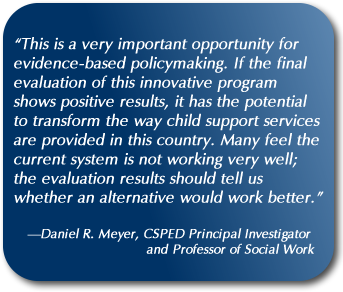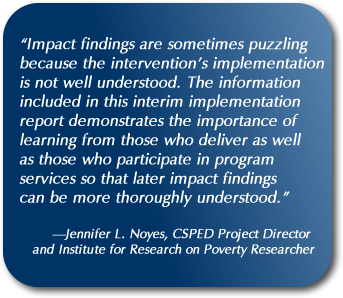Child Support Noncustodial Parent Employment Demonstration Evaluation (CSPED)
Maria Cancian and Daniel R. Meyer, Principal Investigators
Lawrence Berger, Katherine Magnuson, Jennifer Noyes (Project Director), IRP Co-Principal Investigators
Robert Wood, Mathematica Policy Research Principal Investigator
About CSPED | Early Implementation Findings Report
About CSPED
Child support is a critical financial resource for children living apart from one of their parents. Recent demographic and policy changes have made an effective child support system increasingly important. A successful system must both enable and enforce noncustodial parents' contributions and requires effective policies to encourage noncustodial employment. Despite policy innovations designed to improve enforcement, the amount of unpaid support is at record levels.
The National Child Support Noncustodial Parent Employment Demonstration (CSPED), launched in October 2012, is designed to identify effective policy alternatives to address these needs. A rigorous evaluation of CSPED conducted by IRP researchers and colleagues at Mathematica Policy Research, in collaboration with the Wisconsin Department of Children and Families has the potential to inform critical national debates about how best to serve noncustodial parents and their children.
The demonstration is an initiative of the Office of Child Support Enforcement in the U.S. Department of Health and Human Services' Administration for Children and Families, which awarded grants totaling $6.2 million to child support agencies in eight states to link parents with employment services and to evaluate the programs. The programs provide
- Integrated case management;
- Employment-oriented services that include job placement and retention;
- Fatherhood/parenting activities using peer support; and
- Enhanced child support services including the review and appropriate adjustment of child support orders.
The eight demonstration site states are
- California
- Colorado
- Iowa
- Ohio
- South Carolina
- Tennessee
- Texas
- Wisconsin
The five-year evaluation of the CSPED projects utilizes a random assignment design in which eligible noncustodial parents are randomly assigned into treatment and control groups, in order to gauge programs' impact on participants. An implementation study and a benefit-cost study are also included.
Early Implementation Findings Report
Press Release | Executive Summary | Full Report
An interim implementation report on CSPED was released on September 1, 2015, and reflects demonstration activities that began in fall 2012, when the eight child support agencies began a one-year planning period, as well as activities during the initial year of program enrollment.
During the planning period, each of the eight grantees formed required partnerships, developed service-delivery plans, and refined eligibility criteria. Ultimately, grantees designated a total of 18 implementation sites, ranging from one to five counties per grantee.
 Beginning in the last quarter of 2013, grantees began enrolling participants in the demonstration. Half of the enrollees will be randomly assigned to receive CSPED services, including enhanced child support services, employment assistance, parenting education delivered in a peer-supported format and case management. Half will be assigned to a control group and will not receive extra services. Each grantee aims to recruit 1,500 eligible noncustodial parents.
Beginning in the last quarter of 2013, grantees began enrolling participants in the demonstration. Half of the enrollees will be randomly assigned to receive CSPED services, including enhanced child support services, employment assistance, parenting education delivered in a peer-supported format and case management. Half will be assigned to a control group and will not receive extra services. Each grantee aims to recruit 1,500 eligible noncustodial parents.
Throughout the two-year time period reflected in the report, grantees and their partners experienced a steep learning curve. In particular, the CSPED grantees grappled with several challenges including
- reorienting child support staff and systems toward helping low-income noncustodial parents obtain employment;
- recruiting noncustodial parents to enroll in CSPED;
- keeping participants engaged in services;
- addressing participants' multiple barriers to employment such as criminal records, lack of work history, and low levels of education;
- establishing partnerships and meshing different organizational cultures; and
- helping participants with parenting time issues.
Although the implementation report covers an early period of CSPED operations and reflects grantees initial efforts to implement the demonstration and overcome challenges, early lessons can be drawn from observations shared by staff and a synthesis of implementation data collected to date.
 These early lessons include the importance of using child support workers who support CSPED's goals to identify and recruit participants; developing services that take into account the substantial barriers to employment faced by the target population; designing services to promote sustained participant engagement; and investing in strong partnerships and communication systems.
These early lessons include the importance of using child support workers who support CSPED's goals to identify and recruit participants; developing services that take into account the substantial barriers to employment faced by the target population; designing services to promote sustained participant engagement; and investing in strong partnerships and communication systems.
The demonstration will continue operating through September 2017, or three years beyond the time period reflected in the report. A final implementation report will examine the full implementation period and provide a more comprehensive assessment of the types and dosage of services participants received. The report will focus on the infrastructure and supports that facilitated implementation, program features that appear to promote higher levels of participant engagement, promising strategies for helping participants obtain employment and make regular child support payments, and strategies for overcoming common implementation hurdles. A final report will examine CSPED's impacts on participants' outcomes and include a benefit-cost analysis.





